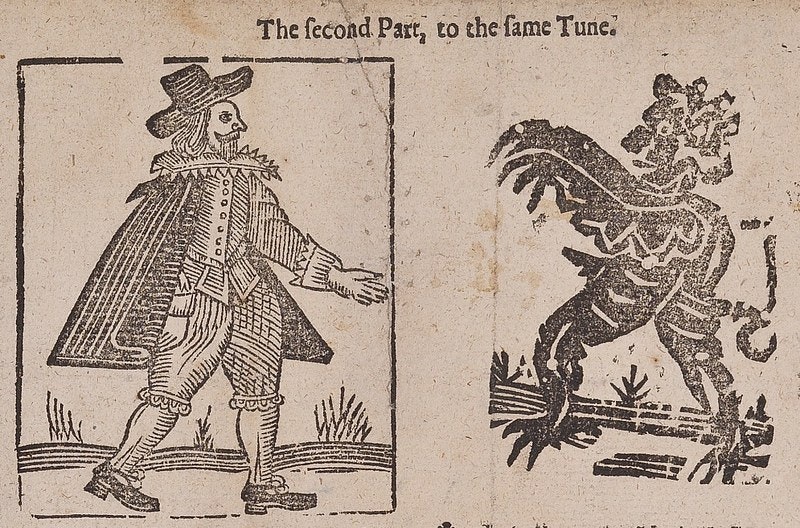Empathy and Class Design
 Image: E. Andrews, Two woodcuts from "Strange News from WESTMORELAND," ~1660.
Image: E. Andrews, Two woodcuts from "Strange News from WESTMORELAND," ~1660.
Or GLoGtober 4b...
These days, I feel like a week doesn't go by that I don't reference CyberChronometer's blog post "The GLOG: Core Classes Reimagined." If you aren't familiar, I heartily recommend it. I'm sure folks are sick of me saying that a player's class is a flag on the kind of storytelling they want to do at the table. Well, this post extends that logic to the type of game mechanics they want to engage with. The classes themselves are interesting here, but the core design experimentation of asking "what can a GLoG class care about?" is what I keep coming back for.
It also doesn't hurt that the post proposes four resource mechanics (after a fashion) - something I think is often under-considered in most GLoG content I read.
I bring CyberChronometer's post up not to gush, but to connect it to another text. Recently I've been playing some Pathfinder 2nd Edition. In the process of learning the new system, I was discussing the various class options in that game with my good friend and GM for that group. CyberChronometer's post came up as we discussed some core assumptions: Why have classes at all? What's good about having feats or class features? Are good features narrative hooks or do they provide prescriptive in-game actions?
Both my friend and I love CyberChronometer's Fighter and Wizard. They express the fantasy of the fictional archetype while minimizing the fiddly rules memorization and fuss. For my part, I was colder on the Cleric and coldest on the Rogue. The Cleric is a peek into a game based on bookkeeping and attrition, bumping your numbers up and managing how many resources you spend throughout the adventuring day. I understand the appeal of that, it's just not for me. The Rogue basically injects more variance to the game, adding more dice rolls to dodge consequences or get past challenges. The rogue gets "better" by gaining more dice to throw around or situations you can apply them to, but to me that means that you mostly are just underlining verbs you already have rather than gain new ones. Worse still, adding a die roll to something like scouting or leading a party through difficult terrain feels like it clashes with the meat of play - describing narratively how your character reacts to the situation. We always engage with some amount of abstraction when it comes to the attributes and skills of our characters, but this just feels like a bridge to far - like the fiction falls away only to reveal the rote dice rolling beneath.
Which brings me to the other text. Magic the Gathering's head designer maintains a tumblr where he responds to questions and comments from the game's fans. In a post a few months back, he talked about MtG's design policy of "Inclusion Over Exclusion". I'll let his words speak for themselves, but he describes the experience of finding something in the game annoying and immersion breaking, only to realize that someone else likely thought the same about things he liked and that he didn't lose anything by adding the things that someone else wanted. As he puts it:
"Magic is too broad to not occasionally do something that any one player might prefer not to do. That’s where the customizability comes in, and even more importantly, that’s where the empathy comes in."
This "live and let live" mentality is pleasant, of course, but I also think there is a critical game design insight here. As a designer (of GLoG classes and beyond), it's easy to design things that you would like to play. It's harder to design something you wouldn't, but is still nonetheless coherent and fun. It requires a certain empathy or perceptivity that takes real work.
I think that's given me a renewed appreciation for CyberChronometer's Rogue and Cleric. They might not be for me, but they do seem to work and I could see how someone could have fun with them. I imagine CyberChronometer experiences some similar set of preferences - some set of classes being more aligned with their tastes and some less. Our likes and dislikes inform our creative voices, of course, and there is more to design than appealing to the maximum quantity or variety of players, but I do think it's valuable to take on a more audience-focused mindset in our writing.
There is an exercise here, if you are interested enough to undertake it:
Go design a class for someone else. Don't just make a response to a GLoGtober prompt, but make something for someone who enjoys a totally different aspect of the hobby than yourself. See what they think of it and see what you can safely fold into your other designs.